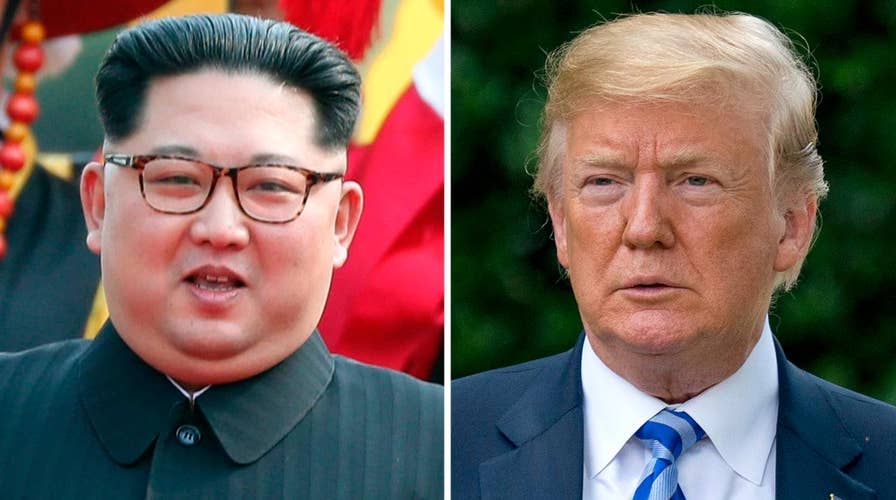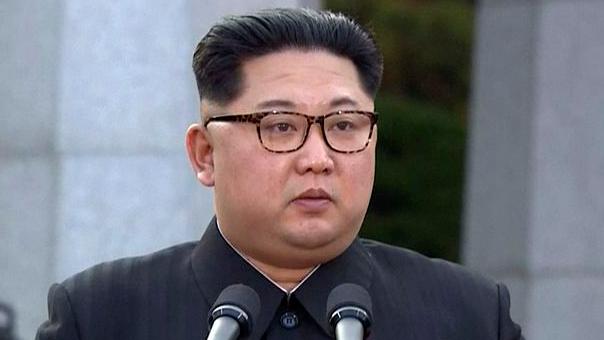One week out from possible North Korea summit
White House is tamping down expectations ahead of the summit with Kim Jong Un. Kevin Corke reports from the White House.
When President Trump announced Friday that his historic summit with North Korean dictator Kim Jong Un was back on for June 12 in Singapore, he didn’t restate his demand that the North agree to some sort of denuclearization pledge as a precondition for the meeting.
The Trump administration is still insisting that it will continue economic sanctions and diplomatic pressure on North Korea to pressure Kim to get rid of his nuclear weapons – what can only be called a containment strategy.
But it was clear Friday that President Trump had a different tone following his meeting in the Oval Office with Kim Yong Chol – a vice chairman of North Korea’s Central Committee and one of Kim Jong Un’s most trusted advisers.
Why the big change from just a few days before, when President Trump had canceled the summit?
It may be that President Trump toned down his rhetoric to give Kim Jong Un space to deal with hardliners in his government and military who oppose making nuclear disarmament a reality.
Recent headlines point to such a possibility. Multiple news organizations report that over the weekend Kim Jong Un fired or deposed three top army generals – officers who would likely be upset over North Korea potentially giving up its atomic insurance policy.
If Kim wants to agree to a denuclearization deal, he will need domestic support. To get that support, he will need to show he is getting something in return from the U.S. and not simply caving to President Trump’s demands.
“What could have happened, either in meetings with (Secretary of State Mike) Pompeo, or in the Oval Office, is that North Korean officials explained to the administration they have a problem,” a former senior national security official who served in George W. Bush administration told me, speaking on background.
North Korean officials “may have explained they are committed to CVID (complete, verifiable, irreversible denuclearization) but were afraid of domestic opposition, either in the military or in the highest circles of Kim’s regime,” the former official told me.
The official speculated that the North Koreans may have said to President Trump: “We need some time to shift our nation’s and our government’s internal thinking on this – we need some diplomatic space to do it.”
That would explain the change in tone from President Trump as well as what Kim Jong Un’s decision to purge the three generals. Kim might have been sending a signal to internal audiences: get onboard with better relations and denuclearization – or else, the official said.
The former U.S. official went on to say: “Kim needs to know there won’t be a coup when he is in Singapore if he makes a nuclear deal with Trump. And that might explain why Kim was so obsessed with security arrangements for the summit when he spoke to Pompeo the last time in Pyongyang. The regime might not be as secure as we think.”
While it is always a challenge to make any predictions when it comes to any events inside North Korea – and especially the hermit kingdom’s internal politics – we do know for a fact how much Pyongyang has emphasized the achievement of building and deploying nuclear weapons in its propaganda.
For the Kim regime, its so-called “treasured sword” of nuclear weapons is a crowning achievement, something that defines the impoverished nation of 25 million – what one senior Trump official recently described to me as “a Fourth World nation with nukes.”
Pictures of missiles and nuclear weapons are splattered across billboards around North Korea, placed on stamps and are part of countless news and radio programs. They are displayed proudly, as something that Pyongyang would never, ever give up. North Korea has even gone so far to place keeping its nuclear weapons in its constitution – so staying a nuclear power is clearly something hard to walk away from.
Here is where things could get dangerous. As we all know, the Kim regime is not exactly an honest broker, and could be just using domestic challenges as an excuse to stall for time.
Just a cursory review of America’s past diplomatic attempts to craft a better relationship with North Korea show a 100 percent track record of failure for one reason: the Kim regime never, ever, keeps its word – going back to the current dictator’s father and grandfather who ruled before him.
We should be leery that Pyongyang could once again be using its old diplomatic playbook, albeit with a fresh cover. The Kim regime will do anything it can to stall for time, seeking to hold onto its nuclear weapons and to make them more powerful.
It is also important to remember that Kim purges officers in his military quite regularly, and the timing of the most recent purge just could be a coincidence.
In fact, in a recent letter reportedly authored by Kim Jong Un to his foreign ministry, he discussed “protecting our nuclear power” – not exactly a ringing endorsement of nuclear disarmament.
“The Trump administration must be very cautious,” explained another former senior U.S. official who served in the George H.W. Bush administration. “While it is very possible North Korea could very well need some cover domestically, we can’t give them forever. They need to commit to something on nuclear weapons or we are just repeating the mistakes of the past – and that would be a real shame.”
Indeed, the Trump administration must begin to truly press North Korea now on a nuclear weapons pledge – to be declared right before or during the summit – or we run the risk of making an even grander mistake than other administrations in dealing with the Kim family.
Giving Kim a summit with the president of the United States and getting nothing to show for it would be a colossal mistake by the Trump administration that history would not look kindly on.


